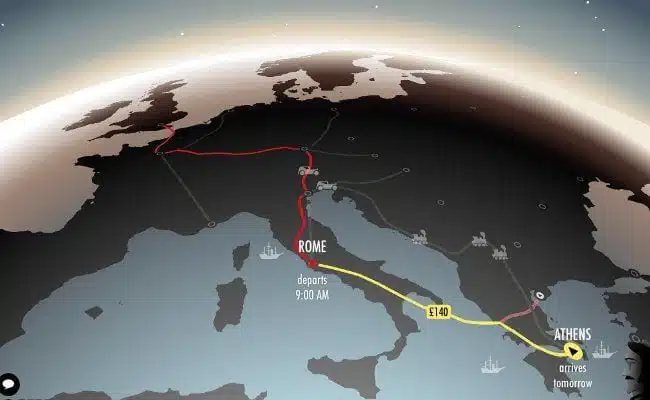
Phileas Fogg has just hired a new manservant, Passepartout, of French designation. Being of a genial nature and a person of meticulous timing, Fogg keeps to a set schedule leaving Passepartout an easy enough job. However, one day he makes a bold declaration and bets his entire fortune against the money of various members of the Reform Club, of which he is a member, after reading a certain news article in the London Times that it is in fact possible to circumnavigate the globe in only 80 days.
The other members of the club are astonished by his declaration and consider the matter so foolhardy and made in the with such rash judgment that they are willing to allow him to retract the bet. Fogg declines. In a hasty rush, he tells Passepartout to quickly pack a suitcase, and they are off to begin their extraordinary race around the world in 80 days.
So is the set up for Jules Verne’s famous adventure novel. Likewise, it is the set up for Inkle Studios iOS adaptation of the novel. However, the Phileas Fogg of Inkle Studio’s game, 80 Days, is not so fastidious a traveler as he is in the book. There is no set plan established through meticulous time tables that are assured to go awry, there is no pack filled with bank notes ready to resolve any problems that may arise, and there is no general active participation in the decision making process on his part. On the other hand, the part of Passepartout has been expanded beyond that of a befuddled and bemused companion. Fogg acts the part of the noble, yet aloof gentleman, while Passepartout does all the legwork making travel plans.
As Passepartout, the player must manage many different resources, but the most important is time. The clock is always ticking. Each action in each city takes up time, a few hours at the least. Sometimes that is not a problem, as you wile away the day waiting for your connection tomorrow. Other times a pause in tapping the right menu will cost those oh so few precious seconds that represent minutes that allow for a ship to depart leaving you waiting for the next one. But you cannot spend your time waiting around your means of transport so as not to miss it. Transportation costs money, as does accommodations, and you have limited funds. You will have to visit the market in a city and buy items that will sell for greater profits elsewhere in the world or burn a few days waiting for the local bank to authorize a withdrawal.
Additionally, Passepartout will have to manage the health and well-being of his master. Each trip takes its toll upon the noble English gentleman. And don’t forget to keep your ears open to listen to what the people in the streets of any given city have to say along with the crews of the various means of transporting you from one destination to the next. Their observations can help you to plan each leg of your journey more effectively or more importantly help you to not get stranded in the middle of nowhere, lacking knowledge of a connection. Throughout all of this, in each city you’ll get caught up in adventurous shenanigans and the shenanigans are the best part of the game.
Whereas Jules Verne’s novel consisted of only one trip around the world, 80 Days contains multitudes. Cross Russia on the Trans-Siberian railroad, sail around the Arabian peninsula, fly a zig-zag route across the Caribbean, and engage in so many other possibilities. The best route might not necessarily be the most direct. And I can’t help but feel that I might have buried the lede here, since as you travel, you might notice this Victorian era world looks slightly different from the one that we recognize from our history. Flying machines and mechanized camels and industrial coaches and many, many more steampunk inspired devices are your means of travel. It’s not just the technology of travel that has been revolutionized, but the entire world. The social and political landscape is radically different. Female zeppelin pirate captains, international guilds, African air superiority, time viewing crystals. We are given a tourist’s view of this world as these many unusual revisions to history zip by us during this challenge to circumnavigate the globe in the allotted time. After a while, the goal seems so less important. The titular 80 Days are a macguffin.
As soon as you complete your journey, whether victorious or in triumphant defeat, the game will ask if you would like to play again. The world is filled with revolutions and peacetime local interest stories, imperial resentment, burgeoning new technologies, and hundreds of interesting individuals all concerned with their own personal stories that you are passing through as they pass through yours. This is ultimately what is the main draw of 80 Days, but that doesn’t diminish the importance of the game’s central mechanics, resource management. That’s what contextualizes your journey because it is your journey. An interesting world may be sketched out here that is filled with infinite possibilities, but you are not an actor upon it. You merely bear witness to it during your travels.

